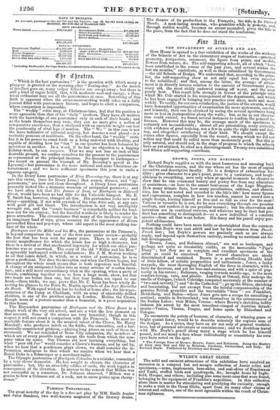BROWN, JONES, AND ROBINSON.• Richard Doyle supplies us with the
moat humorous and amusing bock of the Christmas season, and the one whose art has the moat of capital inventive and descriptive faculty. He is a designer of exhaustless fer- tility ; gives character to a pin's point, grace to a caricature, and laugh- ableness to everything, save only when at special moments he chooses to show that he can command beauty and poetry free from any admixture of quaintness,—as here in the sunset boat-scene of the Lego Maggiore. How many minute facts, how many peculiarities, oddities, and absurd- ities, has he not noted and recorded to the life's life! how many figures and expressions, complete in how few touches, cannot he crowd into a single design, leaving himself as free and as full as ever for the next! Various or versatile he is not, for he sees everything through one peculiar medium, and renders it in one peculiar manner; but his observation and invention are in continual exercise, and whatever may be their last pro- duct has something to distinguish it—as a new individual of, a constant species—from all that went before. His fancy and his pencil enjoy per- petual adolescence.
Nothing could have been more futile or shortsighted than the common notion that Doyle was cast adrift and lost by his secession from .Punch. Punch lost ; but Doyle's powers are precisely such as are• always ready, and depend upon themselves entirely, needing no extrinsic aid for full development.
" Brown' Jones, and Robinson Abroad," are not so burlesque, and perhaps not quite so irresistibly risible, as the memorable "Pipa's Diary " ; but they are as complete and excellent specimens of the artist as could be conceived. The several characters are nicely discriminated and sustained. Brown is a goodlooking likeable kind of little fellow, of artistic propensities and enthusiasm ; Jones, a lanky maypole, the most thoroughly English of the three in character, with a taste for decorum, and yet for free-and-easiness, and with a spice of pug- nacity in his nature ; Robinson, verging towards middle-age, is the most comfort-loving, vain, and pliable. Landing at Ostend, they undergo the smells of Cologne, (which Coleridge computed accurately at the number of "two-and-seventy,") and "do the Cathedral " ; go up the Rhine, sketching and luxuriating, but not exempt from the baleful companionship of the genuine British grumbler and the unevadable "bore" : see Frankfort, Heidelberg, and Baden—where Jones gets into a scrape for assaulting a sentinel ; ramble in Switzerland ; sun themselves in the entrancement of the Italian Lakes ; visit Milan, Verona—where Brown's sketching hobby induces his arrest by the most truculent-visaged of Austrian detach- ments—Venice, Vienna, Prague, and home again by Rhineland and Cologne.
To enumerate the points of humour, of character, of winning grace or bright quaint fancy, would be to describe minutely the copious sum of the designs. As a series, they have an air not only of general truthful- ness, but of personal adventure or reminiscence ; and we doubtless travel with Mr. Doyle's pencil along many a stage which he has himself passed, and see many a face whose individuality or eceentricity his own eyes have noted on the spot!
• The Foreign Tour of Messrs. Brown, Jones, and Robinson. Being the Ristnry of what they Saw and Did in Belgium, Germany, Switzerland, cud• Italy, By . Richard Doyle. Published by Bradbury and Evans.


































 Previous page
Previous page